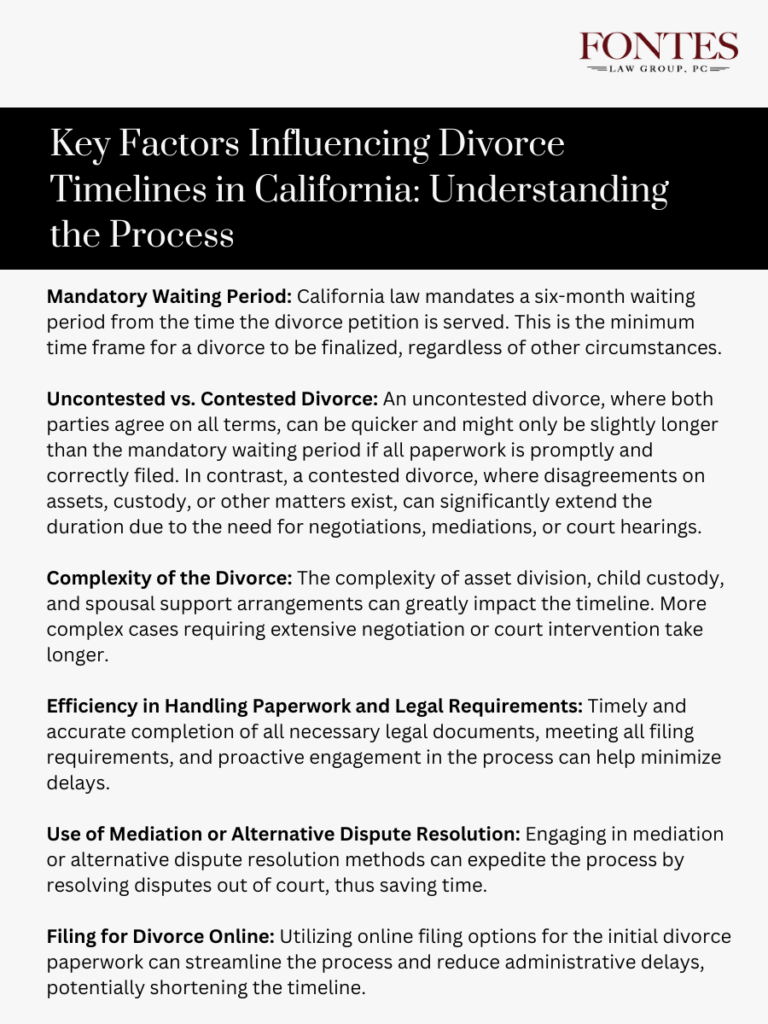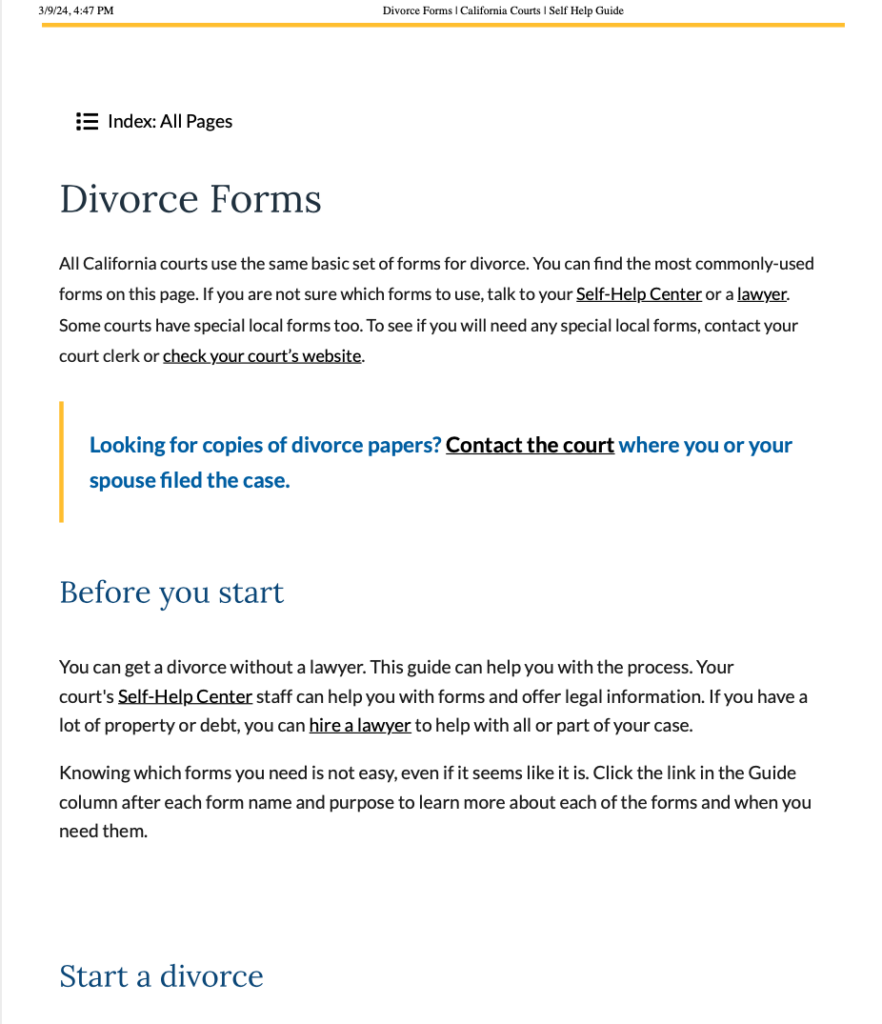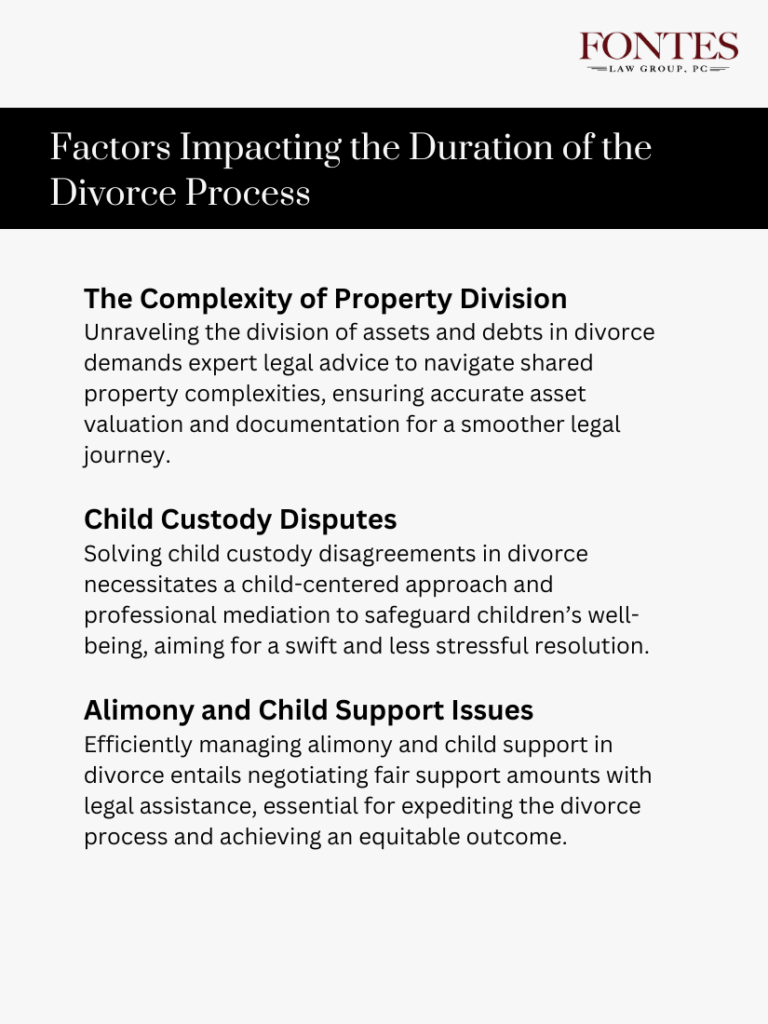Understanding the Timeline for Divorce Proceedings in California

California is known for its breathtaking landscapes, vibrant cities, and thriving entertainment industry. However, the state’s divorce process can be quite complex and time-consuming. If you find yourself in the unfortunate situation of going through a divorce in California, you may be wondering how long the process will take. While the duration of a divorce can vary depending on several factors, understanding the fundamentals of the divorce process in California can help you navigate this challenging time more efficiently.
In this blog, we will explore the various aspects of divorce in California, including the basics of the divorce process, residency requirements, legal grounds for divorce, the filing process, the waiting period, the role of uncontested divorce, factors impacting the duration, divorce mediation, tips to speed up the process, filing for divorce online, and frequently asked questions.
Let’s delve into the details of how long it takes to get a divorce in California, and the amount of time it may take depending on the specific circumstances of your case.
Understanding Divorce in California
Going through a divorce is often emotionally and financially draining, and the state of California has specific laws and procedures in place to handle divorce cases. Whether you’re considering filing for divorce or have been served divorce papers, understanding the divorce process in California is crucial. From the legal requirements to the waiting period, various factors can impact the duration of the divorce process in the state. Familiarizing yourself with the necessary basic steps and potential challenges of family law can help you navigate the process more smoothly and make informed decisions.
The Basics of Divorce Process in California
Navigating the dissolution of marriage in California starts with filing a petition, a critical initial step in the California divorce process. Each divorce case differs based on individual situations, requiring a tailored approach. Understanding the timeline is essential for a smoother process. California courts uphold stringent guidelines throughout divorce proceedings, which can be expedited if the spouses have already agreed on all issues and file a written agreement with the initial petition. Seeking legal guidance is advisable to traverse the complexities with ease.
The Role of Residency Requirements in Divorce
Understanding and meeting residency requirements is crucial when considering a divorce in California, as they dictate eligibility to file within the state. Prior to initiating divorce proceedings, a clear comprehension of residency laws is essential. These regulations, which differ based on legal jurisdiction, must be strictly followed to ensure a valid divorce filing. Compliance with residency requirements is a fundamental step in starting the divorce process smoothly, adhering to the legal framework set forth by the state of California.
Grounds for Divorce in California
In California, couples can opt for a “no-fault” divorce citing irreconcilable differences, streamlining the process. Additionally, grounds like incurable insanity and fault divorce are recognized, providing alternative paths. Understanding these legal bases is fundamental to commencing divorce proceedings efficiently with tailored guidance. By grasping the implications of each ground, the complexity of the divorce process can be navigated smoothly through expert legal advice, ensuring clarity and direction in your case for a timely resolution. This insight into the available grounds sets the stage for a well-informed approach towards dissolution, emphasizing the importance of informed decisions throughout the divorce journey.
What are the Legal Grounds?
Legal grounds for divorce in California primarily revolve around irreconcilable differences and the irreparable breakdown of marriage. Recognized legal grounds like incurable insanity are crucial for preparing for divorce proceedings, facilitating a smoother process. Understanding these grounds is key to navigating the divorce journey effectively.
The Divorce Filing Process in California
Navigating the divorce process in California involves several essential steps as outlined in the Family Code, Division 6, Part 3, Chapter 4, which provides detailed legal guidelines for these procedures. Initiating the process starts with filing a divorce petition, which officially kicks off the legal proceedings. Once the petition is filed, the next crucial step is serving the divorce papers to the spouse, as required by the court clerk. This formal notification ensures that both parties are aware of the legal actions being taken. Subsequently, responding to the divorce petition is necessary to move the process forward smoothly. Additionally, exchanging financial disclosures is a mandatory step in the process to ensure transparency and fairness in asset division. These sequential steps form the foundation of the divorce filing process in California.
Filing the Divorce Petition
Initiating the legal process, the formal filing of the divorce petition sets the proceedings in motion. Detailing the grounds and specifics of the divorce, this step kickstarts the divorce journey. Submitting the petition to the court signifies the official commencement of the divorce process. Precision in completing the paperwork is vital for a valid submission. Engaging legal counsel can streamline the process and ensure accurate filing, guiding you through this crucial initial step with expertise and care.
To find the appropriate court for filing your divorce petition in California, you can utilize the resource provided by the California courts at Find Your Court. This tool helps in identifying the specific court where your divorce should be filed, ensuring that your proceedings are initiated in the correct jurisdiction.
Serving the Divorce Papers
Initiating the official notification process involves serving the divorce papers by delivering them to the other party, a legal requirement in California. Ensuring compliance with serving requirements is crucial for the divorce process. Seeking legal guidance can facilitate proper and timely service of divorce papers, streamlining the overall proceedings.
Responding to the Divorce Petition
When presented with a divorce petition, prompt action is essential. Grasping the response procedure holds significance for the recipient, who must address the stated claims. Seeking counsel can aid in formulating the appropriate reply to the petition, ensuring a timely and fitting response, crucial in divorce proceedings.
Exchanging Financial Disclosures
Ensuring financial transparency, exchanging financial disclosures is a vital step in the divorce process in California. These disclosures shed light on assets and debts, crucial for the proceedings. Accurate completion of financial disclosures is paramount to navigating divorce proceedings effectively. Failing to disclose financial information can significantly influence the outcome of the divorce, as required by California law. Seeking legal guidance can help ensure adherence to the necessary requirements for financial disclosure. The process of exchanging financial disclosures serves as a cornerstone for a fair and just resolution in divorce matters.

Understanding the Waiting Period for Divorce in California
The waiting period for divorce in California varies based on the circumstances. It is essential to understand if there is a mandatory waiting period and how it affects the overall timeline of the divorce process. Knowing the waiting period requirements can help manage expectations and plan accordingly for the legal proceedings.
Is There a Mandatory Waiting Period?
The divorce process in California includes a mandatory waiting period, commencing from the date of serving the divorce petition. This period, crucial for thoughtful decision-making, can range from several months to over a year, emphasizing careful consideration before finalizing the divorce.
How Does the Waiting Period Impact the Divorce Timeline?
The waiting period significantly influences the divorce timeline in California. It dictates how long the divorce process takes to finalize, varying based on specific circumstances. Understanding its impact aids in effective planning for a timely resolution, ensuring compliance for a legally binding divorce.
The Role of Uncontested Divorce in California
The efficiency of uncontested divorces in California is notable. Opting for an uncontested divorce can lead to a swifter resolution process. It can streamline the division of assets, determine spousal support, and settle child custody matters amicably. Uncontested divorces often involve less conflict and require fewer court appearances, reducing stress for all parties involved. Couples can create a settlement agreement outlining the terms of their divorce, which can expedite the legal proceedings, as long as they meet the strict requirements for a “summary dissolution.” This approach is particularly beneficial when navigating through the complexities of community property, spousal support, and other legal aspects, ultimately leading to a final divorce without the need for a lengthy court process.
How to File for an Uncontested Divorce
When filing for an uncontested divorce, it is crucial that both parties reach an agreement on all terms. Accurately and honestly completing the necessary paperwork is essential for a smooth process. Opting to file jointly can help streamline the uncontested divorce proceedings and potentially avoid the need for a court order. Seeking legal advice to ensure compliance with all requirements is highly recommended. A properly filed uncontested divorce can significantly expedite the overall process, providing a more efficient resolution for all involved parties.
Benefits of Uncontested Divorce in Shortening the Process
Opting for an uncontested divorce can lead to time and cost savings for both individuals involved. By streamlining court procedures, this approach often results in a faster resolution of the divorce process. Moreover, it helps in minimizing conflicts and stress typically associated with divorce proceedings, fostering a more amicable separation. Ultimately, choosing an uncontested divorce route can significantly expedite the overall divorce timeline, allowing individuals to move forward with their lives more swiftly.
Factors Impacting the Duration of the Divorce Process
Factors affecting how long a divorce takes can include the complexity of dividing property, disputes over child custody, and issues related to alimony and child support. The length of the marriage, the use of a divorce attorney, and the necessity of temporary orders for spousal support may also influence the timeline. Moreover, if there are minor children involved, creating a detailed parenting plan is crucial. Additionally, the judge may consider a number of factors, such as the goal for the receiving spouse to become self-sufficient, when determining the duration of temporary spousal support payments. Understanding these factors and seeking legal advice can help navigate through the various aspects that impact the duration of the divorce process in a community property state like California.

Divorce Mediation and Its Impact on the Divorce Timeline
How divorce mediation affects the divorce timeline is crucial. Mediation can expedite the process by promoting cooperation. Efficient resolution of conflicts leads to quicker settlements.

Understanding Divorce Mediation
In the process of divorce mediation, a neutral third party facilitates collaborative problem-solving between the involved parties. Each mediation session is confidential, allowing for open and honest communication. Active participation by both parties is encouraged in mediation to reach a mutual agreement. This approach fosters effective communication and helps in resolving conflicts amicably. Through mediation, couples can address various aspects of their divorce, such as spousal support, property division, and child custody, in a more personalized and cooperative manner. Ultimately, divorce mediation aims to promote understanding and empathy during a challenging time.
How Can Mediation Speed Up the Divorce Process?
Mediation accelerates divorce timelines by facilitating resolution talks, offering cost efficiencies, expediting court proceedings through agreed terms, empowering parties in decision-making, and fostering swift conflict resolution.
Tips to Speed Up the Divorce Process
By taking proactive steps like hiring a divorce attorney, individuals can expedite the divorce process efficiently. Being organized and responsive to legal requirements can help streamline proceedings.
Hiring a Divorce Attorney
Seeking the expertise of a seasoned divorce attorney is crucial during this challenging time. These professionals offer invaluable legal support throughout the entire process, ensuring strict adherence to divorce laws and regulations. By enlisting the services of a skilled attorney, you not only safeguard your rights and interests but also benefit from their adept negotiation skills in securing favorable settlements. Divorce attorneys adeptly navigate the intricate legal procedures involved, streamlining the process for their clients. Their presence provides a sense of assurance and guidance as you navigate the complexities of the dissolution of marriage and establish a confidential relationship with them.
Being Proactive and Organized
To facilitate a smooth divorce process, timely completion of necessary documentation is vital. Efficiently organizing financial records can accelerate the settlement process. Strategic planning for negotiations can be a time-saving approach. By proactively dealing with issues as they arise, delays can be minimized. It’s imperative to stay well-versed in legal requirements to navigate the process effectively and determine the best time to begin discussing settlement for your specific situation.
Can You File for Divorce Online in California and How Does It Affect the Duration?
Filing for divorce online in California can streamline the initial process, potentially reducing administrative delays. Online platforms offer step-by-step guidance and e-filing can expedite court document processing, ultimately saving time and effort.
Bottom Line
Navigating the divorce process in California requires a comprehensive understanding of legal procedures and timelines. Factors such as residency requirements, contested versus uncontested divorce, and financial disclosures significantly impact the duration of the process. Seeking guidance from a divorce attorney and maintaining proactive organization can expedite proceedings. By exploring alternatives like divorce mediation and online filing, individuals can streamline the process while ensuring a smoother transition. Remember, each case is unique, and compassionate support during this challenging time is essential for a successful outcome. Prioritize self-care and seek professional assistance to navigate this journey with care and diligence.
Frequently Asked Questions
Q: Are there any specific requirements or waiting periods for obtaining a divorce in California?
A: In California, specific requirements for divorce include a mandatory six-month waiting period from when the petition is served. Residency demands that you or your spouse must have lived in the state for at least six months before filing, with a minimum six-month wait to finalize.
Q: Are there any alternatives to traditional divorce proceedings that may expedite the process in California?
A: Consider alternative dispute resolution methods like mediation or collaborative divorce to speed up the divorce process in California. These approaches enable couples to reach agreements outside court, saving time and costs. Mediation involves a neutral third party facilitating negotiations, while collaborative divorce gives each spouse their attorney.
Q: How does the complexity of assets and custody arrangements impact the timeline of a divorce in California?
A: Complex assets and custody battles can significantly prolong a divorce in California. Disputes over businesses, real estate, investments, and child custody can lead to lengthy negotiations and court proceedings, causing delays. Seeking legal guidance is crucial for navigating these complexities and expediting the divorce process.
Q: What role do legal requirements and paperwork play in determining the duration of a divorce in California?
A: Legal requirements and paperwork are pivotal in shaping the timeframe of a divorce in California. Adhering to these diligently can hasten the process, while the intricate documentation involved may lengthen proceedings. Collaborating with a proficient attorney can streamline compliance, potentially expediting the divorce timeline.
